The 8th "Advanced Seminar on Clinical Practice Skills of Geriatrics" and the second day of the training of the National Health and Health Commission's "Prevention and Intervention of Disability after Senile Weakness". The 8th "Advanced Seminar on Clinical Practice Skills of Geriatrics" and the second day of the training of the National Health and Health Commission's "Prevention and Intervention of Disability after Senile Weakness".
On November 8, 2021, jointly sponsored by the Chinese Geriatric Society and the National Clinical Medical Research Center for Geriatric Diseases (PLA General Hospital), The second day of the eighth Advanced Training Course on Geriatric Clinical Practice Skills jointly organized by the International Exchange Working Committee of the Chinese Geriatric Society and the Second Medical Center of the PLA General Hospital and the National Health Commission's "Prevention and Intervention of senile Disability"; and "Prevention and Intervention of Disability after Senile Debilitation" (2019GJWJW7) project, the wonderful course continues.
The first half of the morning session was chaired by Professor Zhang Li and Professor Zhang Lihai from the Second Medical Center of the PLA General Hospital.
 First of all, Wang Jingtong, a teacher from Peking University People's Hospital, shared the importance of perioperative frailty assessment and practical experience in frailty assessment and management of elderly patients with "perioperative management of elderly patients" as the core.
First of all, Wang Jingtong, a teacher from Peking University People's Hospital, shared the importance of perioperative frailty assessment and practical experience in frailty assessment and management of elderly patients with "perioperative management of elderly patients" as the core.
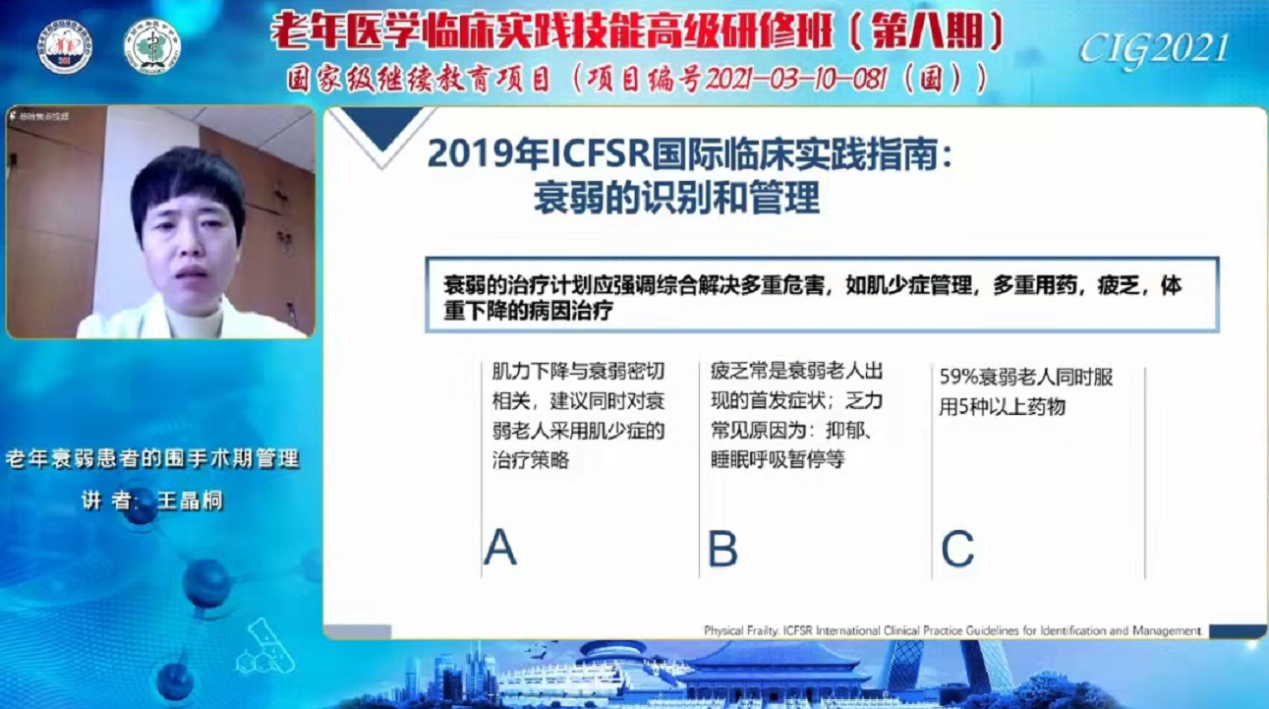 Professor Ban Xiaojuan from the University of Science and Technology Beijing introduced the relevant application scenarios of artificial intelligence technology in the monitoring of the activity ability of the elderly from the perspective of cutting-edge science and technology. She said that with the continuous progress of artificial intelligence, it will be more widely used in clinical and rehabilitation fields in the future.
Professor Ban Xiaojuan from the University of Science and Technology Beijing introduced the relevant application scenarios of artificial intelligence technology in the monitoring of the activity ability of the elderly from the perspective of cutting-edge science and technology. She said that with the continuous progress of artificial intelligence, it will be more widely used in clinical and rehabilitation fields in the future.
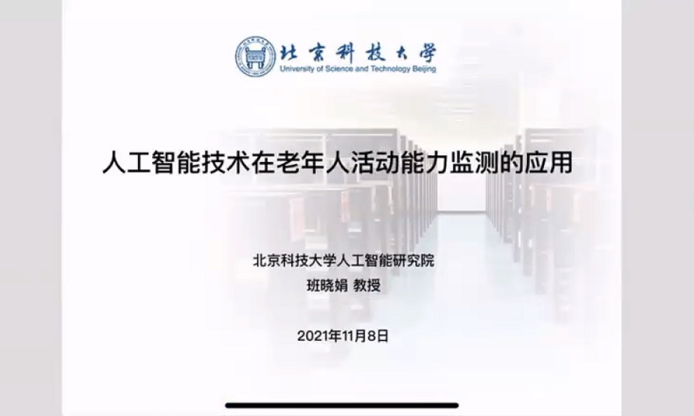 Professor Wang Zhengzhen from Beijing Sport University and Professor Wu Xueping from Shanghai Sport University introduced examples of exercise intervention for chronic diseases and the design and implementation of multi-disciplinary outpatient and exercise rehabilitation programs for the elderly from the perspective of sports. Professor Wang Zhengzhen introduced the basic concept, core content, formulation and implementation process of exercise prescription. As early as 1994, WHO proposed that sedentary lifestyle is the first independent risk factor for chronic diseases. In the 21st century, WHO once again proposed that insufficient physical activity is the biggest public health problem in the 21st century. The Summit forum organized by the United Nations, WHO, American College of Sports Medicine and other organizations in 2011 clearly pointed out that scientific fitness is a low-cost and effective strategy for the prevention and treatment of chronic diseases, and it is necessary to deepen the research on the integration of physical medicine, strengthen the integration of medical care, health and physical health, and promote doctors and health care personnel to become active participants in physical activity. Training of health care personnel, health managers and fitness professionals should also be strengthened. Professor Wang Zhengzhen showed how to select and determine the core contents of exercise prescription based on the personal health information, medical examination results, exercise risk assessment and fitness measurement and evaluation of chronic disease patients with metabolic syndrome cases. The professional knowledge and the matters that should be clarified in the formulation of exercise prescription for chronic patients are emphasized. The participants were able to understand the basic connotation of exercise prescription for chronic patients, which laid a foundation for further study.
Professor Wang Zhengzhen from Beijing Sport University and Professor Wu Xueping from Shanghai Sport University introduced examples of exercise intervention for chronic diseases and the design and implementation of multi-disciplinary outpatient and exercise rehabilitation programs for the elderly from the perspective of sports. Professor Wang Zhengzhen introduced the basic concept, core content, formulation and implementation process of exercise prescription. As early as 1994, WHO proposed that sedentary lifestyle is the first independent risk factor for chronic diseases. In the 21st century, WHO once again proposed that insufficient physical activity is the biggest public health problem in the 21st century. The Summit forum organized by the United Nations, WHO, American College of Sports Medicine and other organizations in 2011 clearly pointed out that scientific fitness is a low-cost and effective strategy for the prevention and treatment of chronic diseases, and it is necessary to deepen the research on the integration of physical medicine, strengthen the integration of medical care, health and physical health, and promote doctors and health care personnel to become active participants in physical activity. Training of health care personnel, health managers and fitness professionals should also be strengthened. Professor Wang Zhengzhen showed how to select and determine the core contents of exercise prescription based on the personal health information, medical examination results, exercise risk assessment and fitness measurement and evaluation of chronic disease patients with metabolic syndrome cases. The professional knowledge and the matters that should be clarified in the formulation of exercise prescription for chronic patients are emphasized. The participants were able to understand the basic connotation of exercise prescription for chronic patients, which laid a foundation for further study.
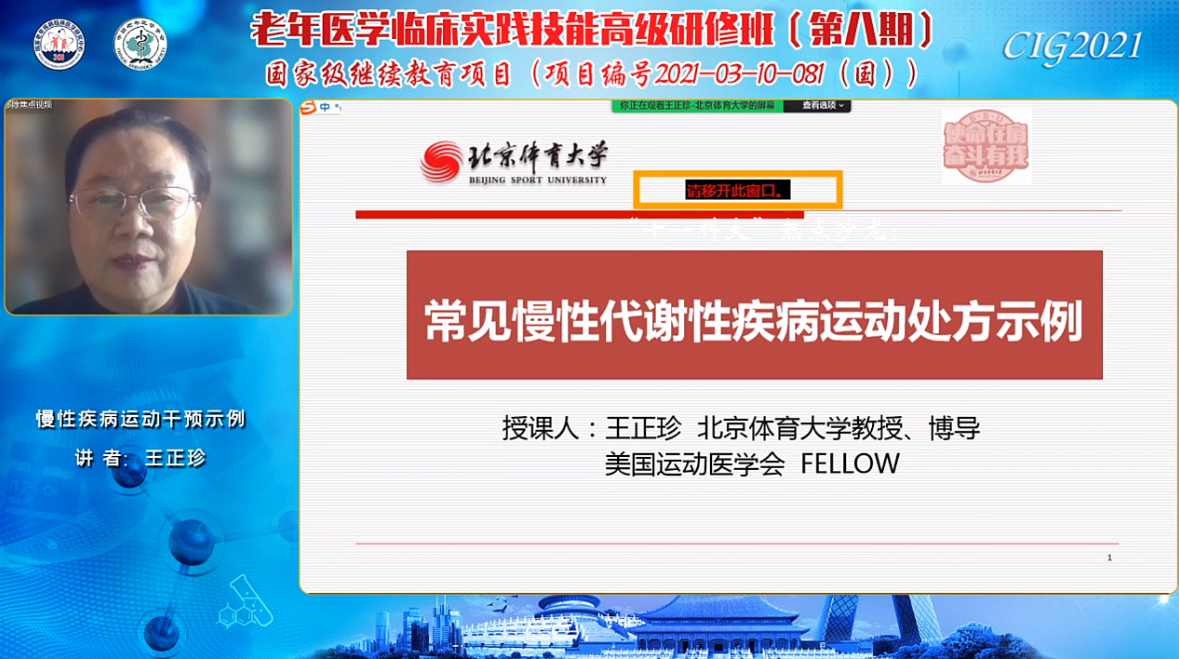 Professor Wu Xueping from Shanghai Institute of Sport shared the joint consultation and comprehensive assessment of clinicians and fitness guidance experts from the perspective of integrated physical medicine outpatient and community sports rehabilitation programs, and conducted exercise intervention through qualified fitness instructors and community health professionals to meet the health needs of different populations. At the same time, Ms. Wu Xueping also shared the community elderly sports health home from the perspective of "physical health integration". The elderly sports health home is also a way of comprehensive application of multi-disciplines in the community, a transformation of physical health integration theory results, a demonstration site for aging, wisdom and digital technology application, and an exploration place for the innovative development of extended physical health integration community. Through the implementation of the project, the multi-level needs of the elderly for health are constantly met, and the community is the unit to promote the health threshold, and provide a full range of health services for the elderly.
Professor Wu Xueping from Shanghai Institute of Sport shared the joint consultation and comprehensive assessment of clinicians and fitness guidance experts from the perspective of integrated physical medicine outpatient and community sports rehabilitation programs, and conducted exercise intervention through qualified fitness instructors and community health professionals to meet the health needs of different populations. At the same time, Ms. Wu Xueping also shared the community elderly sports health home from the perspective of "physical health integration". The elderly sports health home is also a way of comprehensive application of multi-disciplines in the community, a transformation of physical health integration theory results, a demonstration site for aging, wisdom and digital technology application, and an exploration place for the innovative development of extended physical health integration community. Through the implementation of the project, the multi-level needs of the elderly for health are constantly met, and the community is the unit to promote the health threshold, and provide a full range of health services for the elderly.
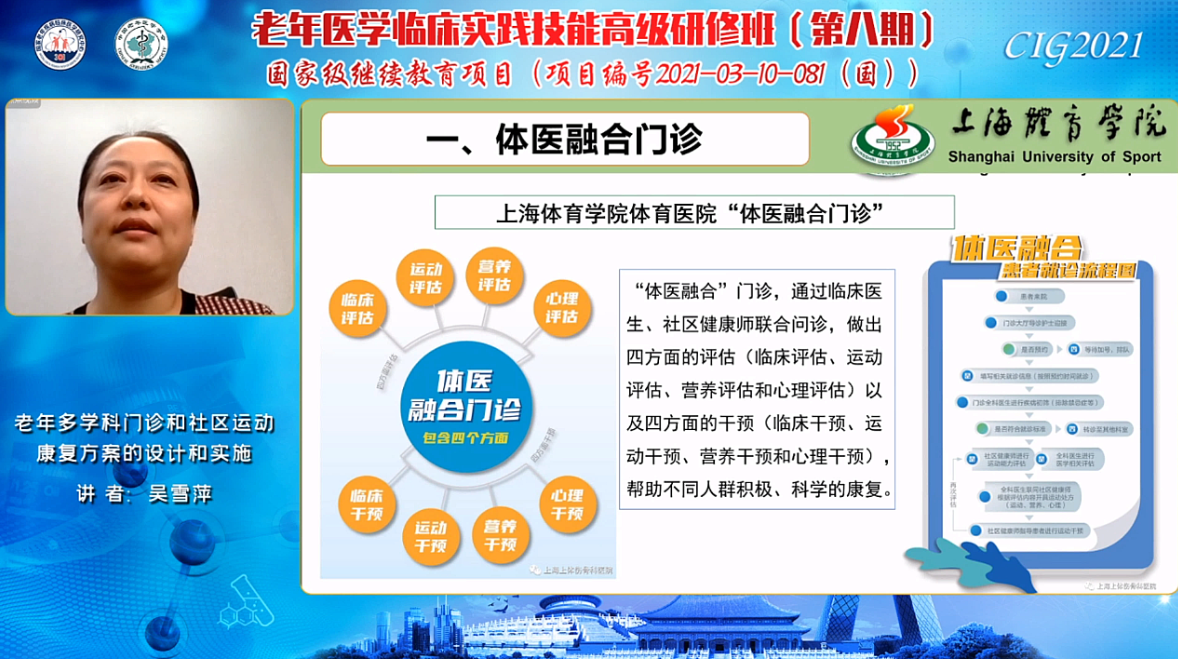
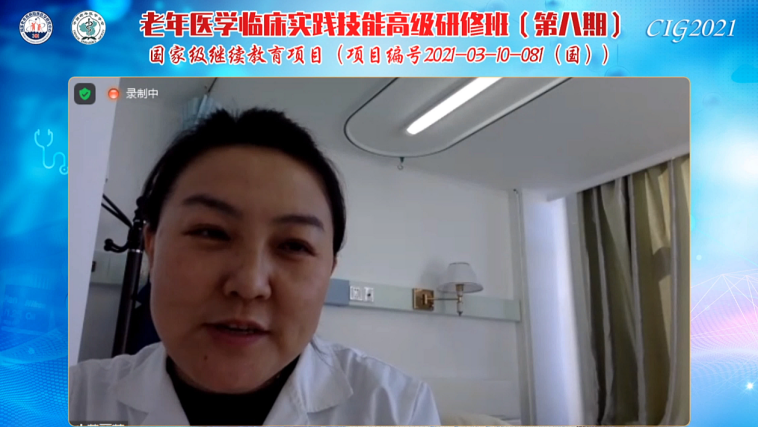 The second half of the morning session was chaired by Professor Huang Liping from the First Medical Center of the PLA General Hospital.
The second half of the morning session was chaired by Professor Huang Liping from the First Medical Center of the PLA General Hospital.
Dr. Hu Yixin, director of the International Exchange Working Committee of the Chinese Geriatric Society and chief physician of the Second Medical Center of the PLA General Hospital, compared the current evidence-based evidence of various assessment tools and interventions in the field of fissile research at home and abroad, as well as clinical and community application options, with the topic of "Factors to consider in the assessment of fissile disease and intervention programs". Problems in frailty assessment and intervention are also raised. She pointed out that the management of fraility is the core of geriatric medicine, and the awareness of fraility screening and individualized management should be established in the emergency, hospitalization, post-acute, community and hospice stages of the elderly. The details of assessment skills should be standardized, and the application of information technology and wearable devices in fraility assessment and intervention management should be promoted. It can promote the early and accurate screening of the management of senile frailty and the ease of landing various measures. Finally, Director Hu introduced some research results achieved by 301 team in the field of geriatric debilitation. The multi-disciplinary outpatient work for geriatric debilitation set up in 301 Hospital and the group standard "Norms for Geriatric debilitation Outpatient Service"; written by experts from multiple hospitals have been released to the society. We hope that everyone can actively participate in the improvement and promotion. Together to improve the early identification and management of aging frailty.
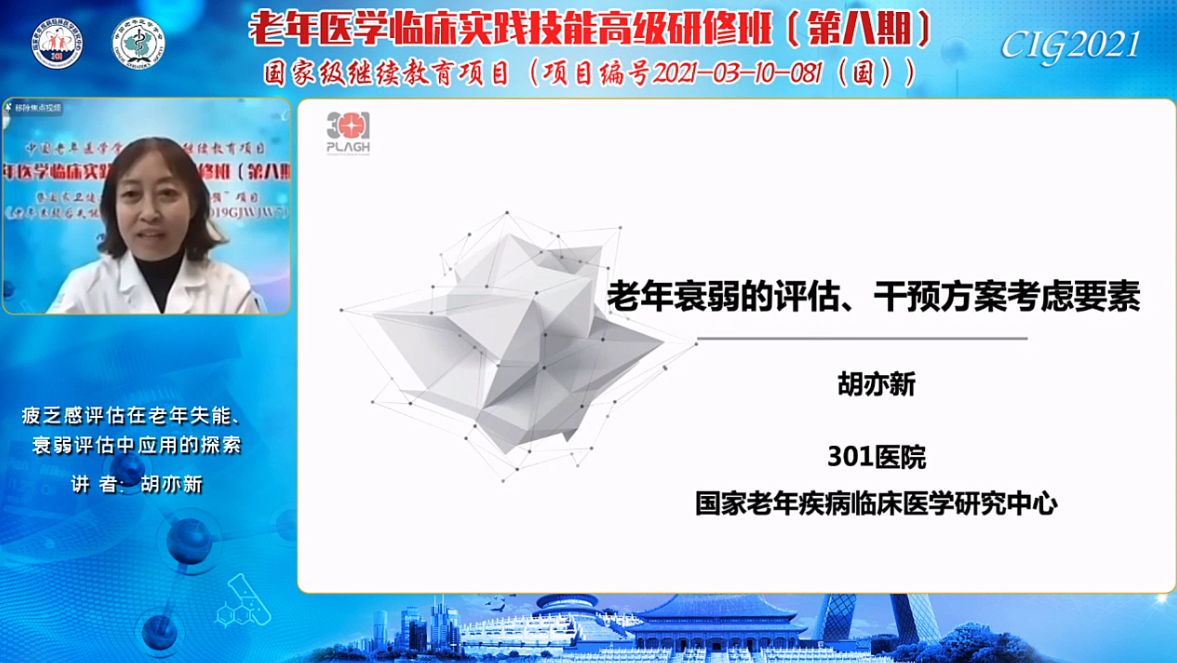 Hao Libo, director of the First Medical Center of the PLA General Hospital, introduced in detail the etiology, pathology, surgical treatment and non-surgical treatment of knee osteoarthritis from the perspective of orthopedics. Elderly knee osteoarthritis is one of the most common diseases of the elderly, the incidence and disability rate are very high, so Director Hao suggested: At present, there are many treatment methods, should be a comprehensive choice, before the decision to operate should be fully non-surgical treatment, if you want to operate, knee replacement is the most effective way, but also to fully communicate with the patient, dispel the patient's fear of knee replacement psychology.
Hao Libo, director of the First Medical Center of the PLA General Hospital, introduced in detail the etiology, pathology, surgical treatment and non-surgical treatment of knee osteoarthritis from the perspective of orthopedics. Elderly knee osteoarthritis is one of the most common diseases of the elderly, the incidence and disability rate are very high, so Director Hao suggested: At present, there are many treatment methods, should be a comprehensive choice, before the decision to operate should be fully non-surgical treatment, if you want to operate, knee replacement is the most effective way, but also to fully communicate with the patient, dispel the patient's fear of knee replacement psychology.
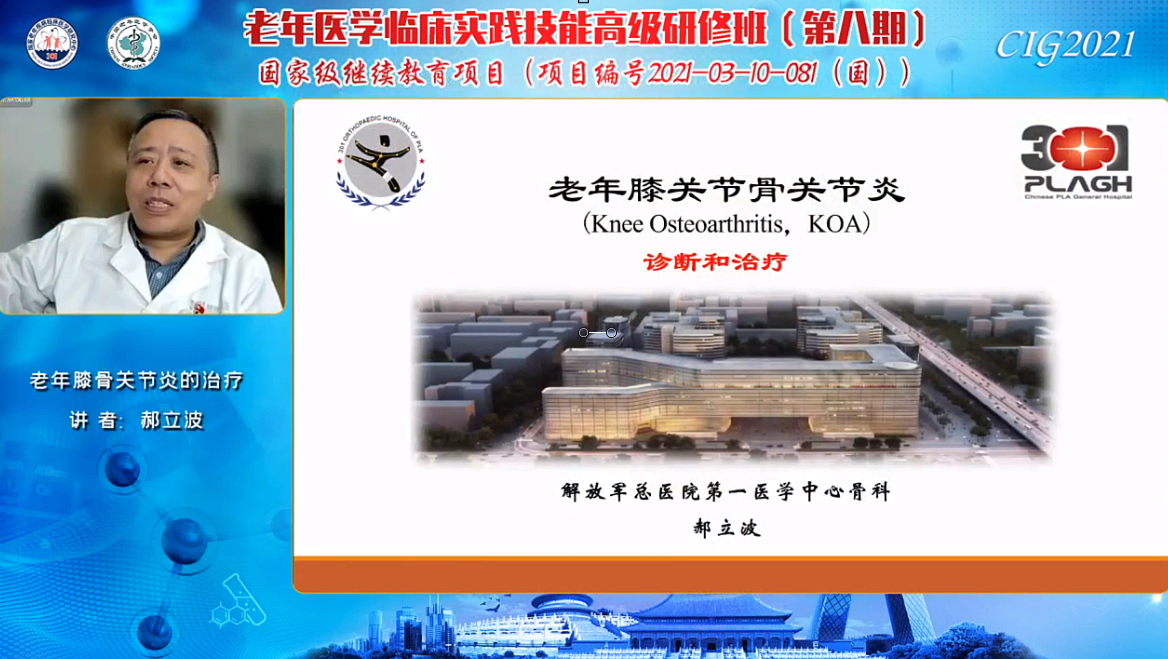
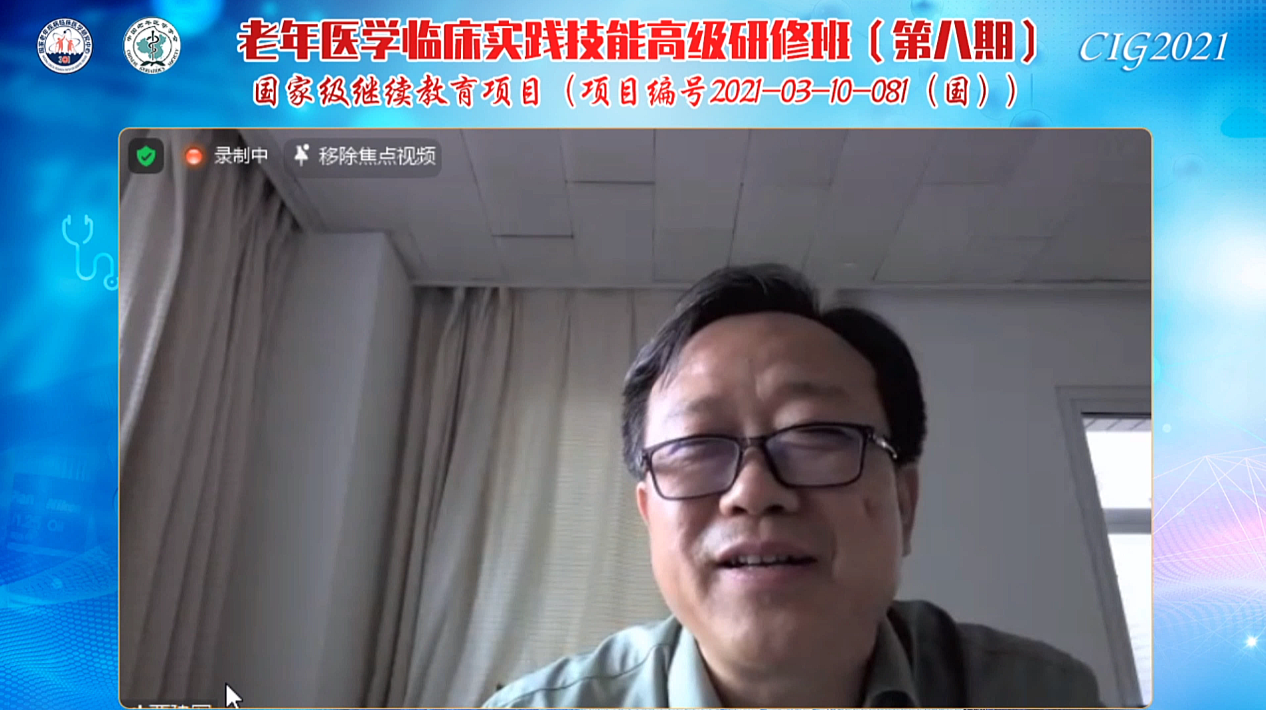 The first half of the afternoon meeting was chaired by Professor Jia Jianjun, President of the Cognitive Disorders Branch of the Chinese Geriatric Society and the Second Medical Center of the PLA General Hospital.
The first half of the afternoon meeting was chaired by Professor Jia Jianjun, President of the Cognitive Disorders Branch of the Chinese Geriatric Society and the Second Medical Center of the PLA General Hospital.
Fu Liping, director of China-Japan Friendship Hospital in Beijing, introduced the AD research framework based on A/T/N biomarker classification system in detail, from the molecular probe imaging mechanism, the interaction between molecular probes and other molecular markers, and the sharing of typical cases to help people understand molecular imaging and intuitively feel the application of molecular imaging in cognitive disorders. Director Fu made a very clear review of the application of positron molecular probes in the early diagnosis and differential diagnosis of AD and its important clinical and scientific research value, which expanded the vision of the joint management of cognitive impairment between clinicians and imaging doctors, and provided a visual basis for the assessment of cognitive dysfunction.
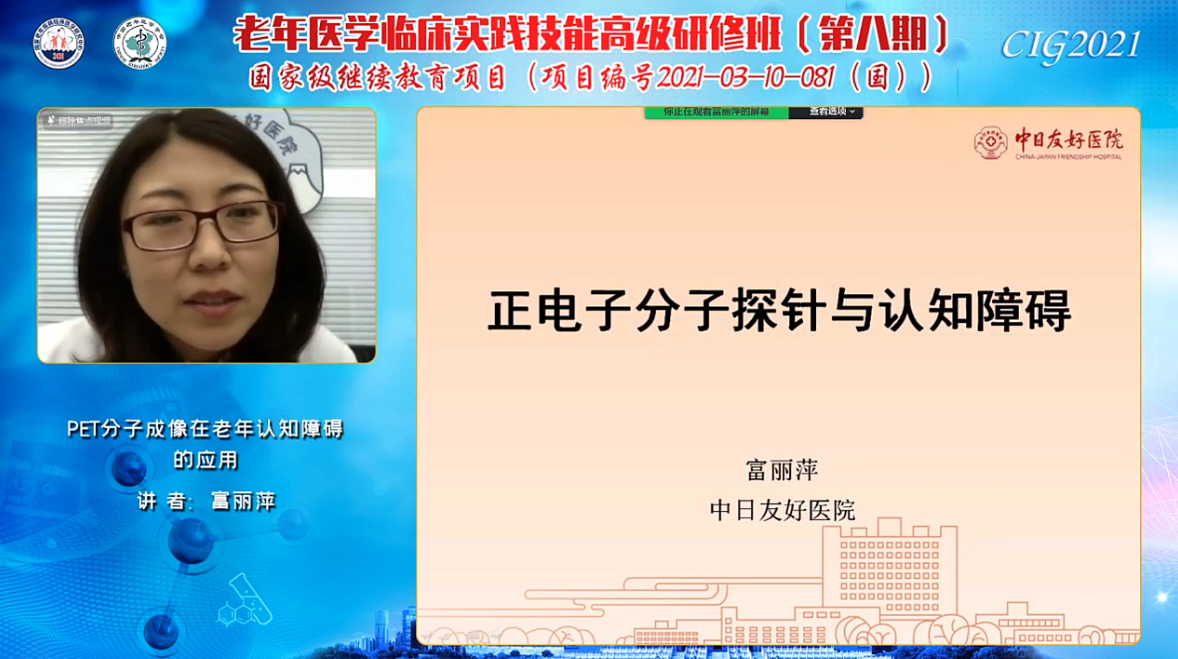 Sun Xinyu, director of the Sixth Hospital of Peking University, made a comprehensive introduction on the recognition and diagnosis of geriatric depression symptoms, as well as its treatment and prevention with the title of "Multidimensional understanding of geriatric depression disorder", so that everyone has a further understanding of the common disease of geriatric depression.
Sun Xinyu, director of the Sixth Hospital of Peking University, made a comprehensive introduction on the recognition and diagnosis of geriatric depression symptoms, as well as its treatment and prevention with the title of "Multidimensional understanding of geriatric depression disorder", so that everyone has a further understanding of the common disease of geriatric depression.
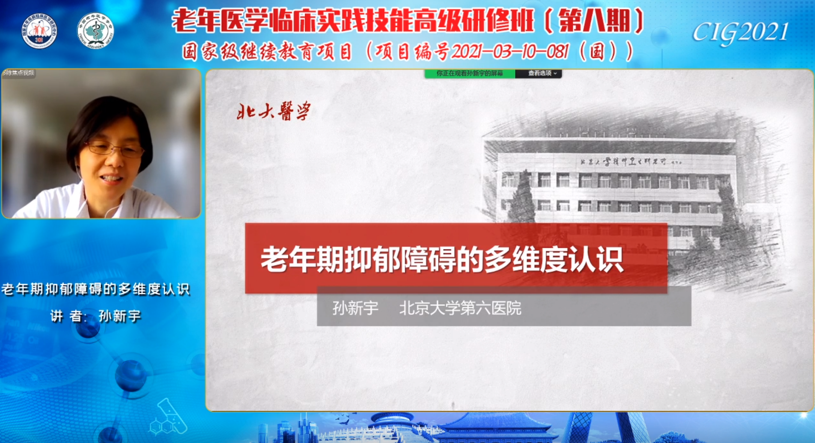 Wang Wei, Director of the Second Medical Center of the PLA General Hospital, has been guiding the standardized training of geriatric cognitive function screening and assessment skills in this course since 2018. This time, we will bring you "advanced training in neurocognitive assessment of aging". She points out that memory measures are common in cognitive psychological assessments of old age, but attention and executive function measures are also important.
Wang Wei, Director of the Second Medical Center of the PLA General Hospital, has been guiding the standardized training of geriatric cognitive function screening and assessment skills in this course since 2018. This time, we will bring you "advanced training in neurocognitive assessment of aging". She points out that memory measures are common in cognitive psychological assessments of old age, but attention and executive function measures are also important.
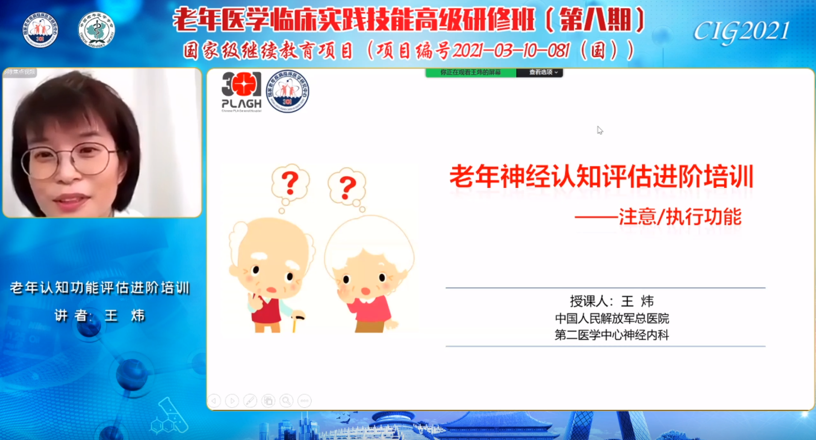 Lu Jihui, director of Beijing Geriatric Hospital, who has been supporting this project since 2018 and is the main guide of the Multidisciplinary Workshop on Geriatric Cognitive Dysfunction, one of the features of this training program, shared with you the "Alzheimer's Disease (AD) comorbidiousness and Medication Precautions";. She said that patients with AD tend to have multiple diseases and a high rate of multimedication, and that such patients should weigh the benefits and risks, and consider life expectancy. In terms of drug use, drugs with good tolerance and safety should be selected, and multiple drugs should be avoided as far as possible.
Lu Jihui, director of Beijing Geriatric Hospital, who has been supporting this project since 2018 and is the main guide of the Multidisciplinary Workshop on Geriatric Cognitive Dysfunction, one of the features of this training program, shared with you the "Alzheimer's Disease (AD) comorbidiousness and Medication Precautions";. She said that patients with AD tend to have multiple diseases and a high rate of multimedication, and that such patients should weigh the benefits and risks, and consider life expectancy. In terms of drug use, drugs with good tolerance and safety should be selected, and multiple drugs should be avoided as far as possible.
 In the afternoon, a multidisciplinary Case Discussion on Geriatric Debilitation Clinic and a Multidisciplinary Workshop on Geriatric Cognition (Phase 3) was also held, chaired by Prof. Yunmei Yang of Zhejiang Medical University, Prof. Leiming Luo and Yixin Hu of the Second Medical Centre of PLA General Hospital, and Prof. Jihui Lu of Beijing Geriatric Hospital.
In the afternoon, a multidisciplinary Case Discussion on Geriatric Debilitation Clinic and a Multidisciplinary Workshop on Geriatric Cognition (Phase 3) was also held, chaired by Prof. Yunmei Yang of Zhejiang Medical University, Prof. Leiming Luo and Yixin Hu of the Second Medical Centre of PLA General Hospital, and Prof. Jihui Lu of Beijing Geriatric Hospital.
First, a team of experts from the PLA General Hospital, including Hu Yixin, Zhang Li, Tian Hui, Wang Wei, Lu Qiang, Liu Yinghua, Chen Mengli, Huang Liping, Xiao Hongju and Yu Zhuoran, shared the cases. Based on the comprehensive assessment of the elderly, the team developed a complete set of management plans, and through follow-up adjustment plans, patients showed significant improvement in the control of blood pressure, blood sugar, blood lipid, swallowing function and weakness of both lower limbs. According to the summary of this case, in the construction of multidisciplinary outpatient clinic for geriatric debilitation, interdisciplinary team consultation should be launched in time based on comprehensive assessment of the elderly. High-level specialist experts should provide comorbidity management, adjustment of multi-drug use, harmonious cooperation of interdisciplinary team working mode and organizational mechanism, support and participation of patients and family members, and establish follow-up mechanism. These are all factors that promote the geriatric multidisciplinary clinic to initiate and implement management programs and effectively benefit the elderly.
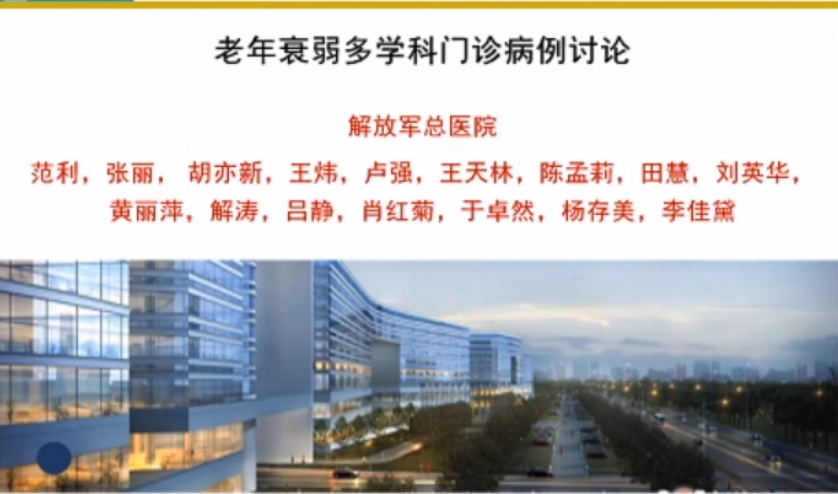
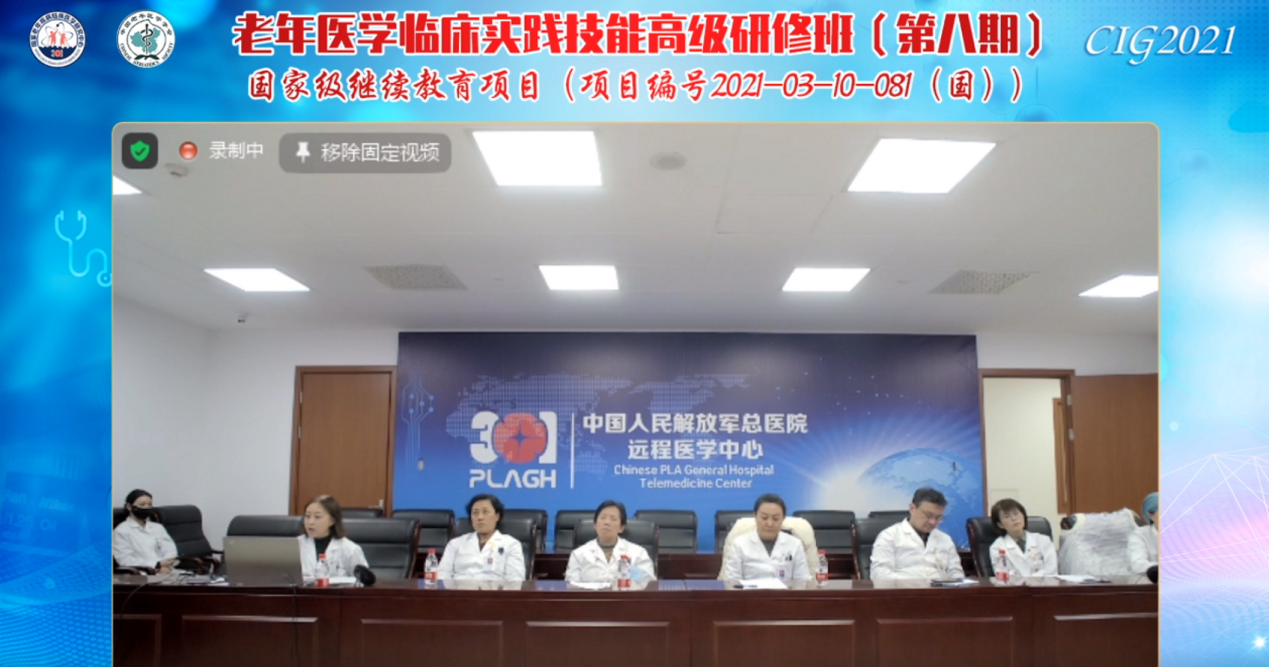 The MDT team from the second Department of Geriatrics of Space Center Hospital shared the second case, which is a 91-year-old male comorbiditis with cognitive decline, anxiety and depression, frailty, malnutrition, and severe functional dependence, etc. Lu Cuilian, Dou Lidong and Wang Lina from the second Department of Geriatrics, Chen Ling from the Department of Mental Health, Xie Qing from the Department of Pharmacy, The interdisciplinary team composed of Xu Meiyan from the Department of Nutrition and Liu Yang from the Department of Rehabilitation worked out a set of integrated management plans for emotions, multiple drugs, nutrition, rehabilitation and care after comprehensive assessment. After active intervention, the patient's condition has improved and he has been discharged from hospital. This case sharing fully reflects that the traditional subspecialty single-disease diagnosis and treatment model is no longer suitable for the elderly, and the interdisciplinary integration team of geriatrics has become an important diagnosis and treatment model for the elderly. Host Yang Yunmei director also gave a high evaluation.
The MDT team from the second Department of Geriatrics of Space Center Hospital shared the second case, which is a 91-year-old male comorbiditis with cognitive decline, anxiety and depression, frailty, malnutrition, and severe functional dependence, etc. Lu Cuilian, Dou Lidong and Wang Lina from the second Department of Geriatrics, Chen Ling from the Department of Mental Health, Xie Qing from the Department of Pharmacy, The interdisciplinary team composed of Xu Meiyan from the Department of Nutrition and Liu Yang from the Department of Rehabilitation worked out a set of integrated management plans for emotions, multiple drugs, nutrition, rehabilitation and care after comprehensive assessment. After active intervention, the patient's condition has improved and he has been discharged from hospital. This case sharing fully reflects that the traditional subspecialty single-disease diagnosis and treatment model is no longer suitable for the elderly, and the interdisciplinary integration team of geriatrics has become an important diagnosis and treatment model for the elderly. Host Yang Yunmei director also gave a high evaluation.
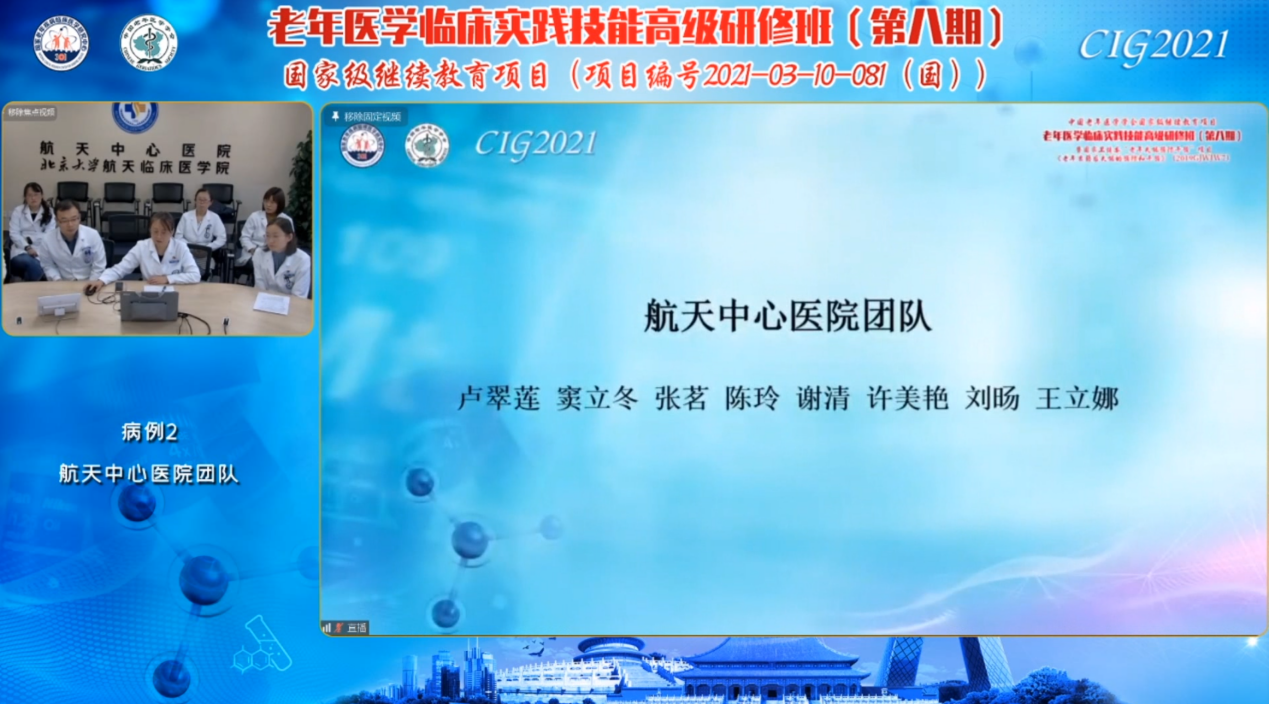
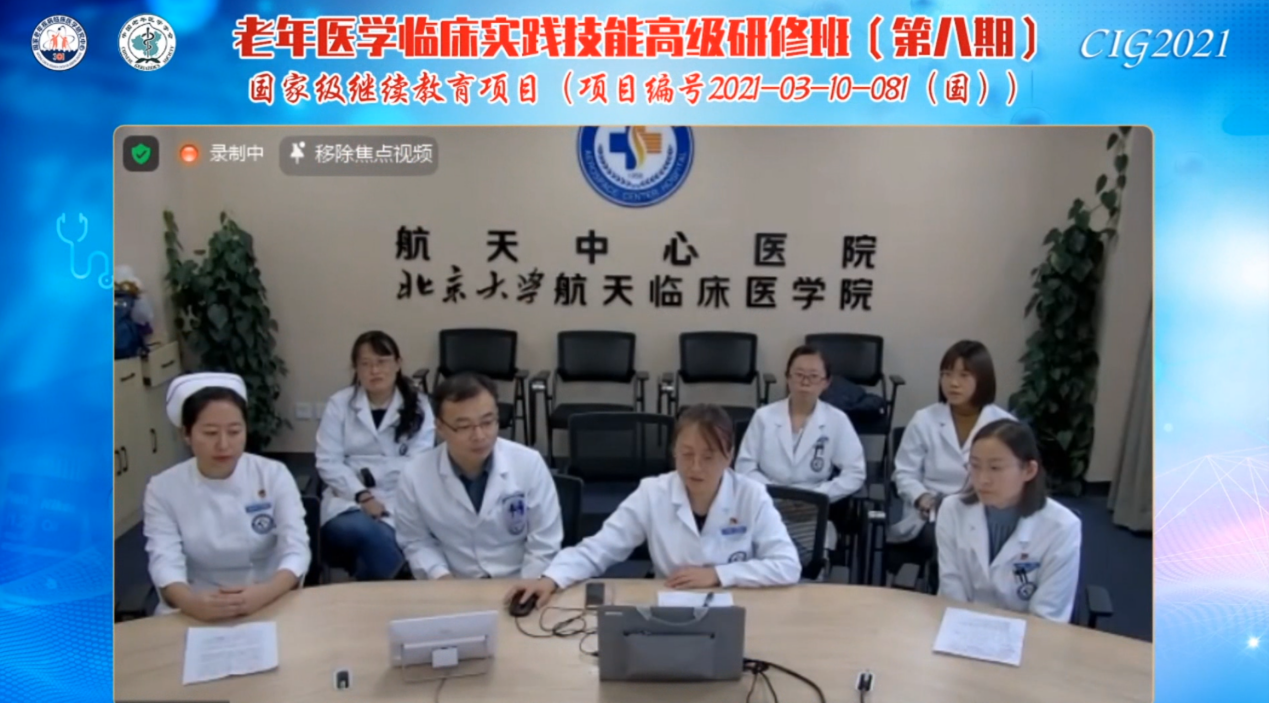 The third case is shared by the team of Director Jing Ping of Zhengzhou Ninth People's Hospital. In the expert comment session, Professor Luo Leiming said: as a municipal hospital, I was very impressed by such high-quality cases and the multi-angle and multi-directional management plan, which is worth learning from.
The third case is shared by the team of Director Jing Ping of Zhengzhou Ninth People's Hospital. In the expert comment session, Professor Luo Leiming said: as a municipal hospital, I was very impressed by such high-quality cases and the multi-angle and multi-directional management plan, which is worth learning from.
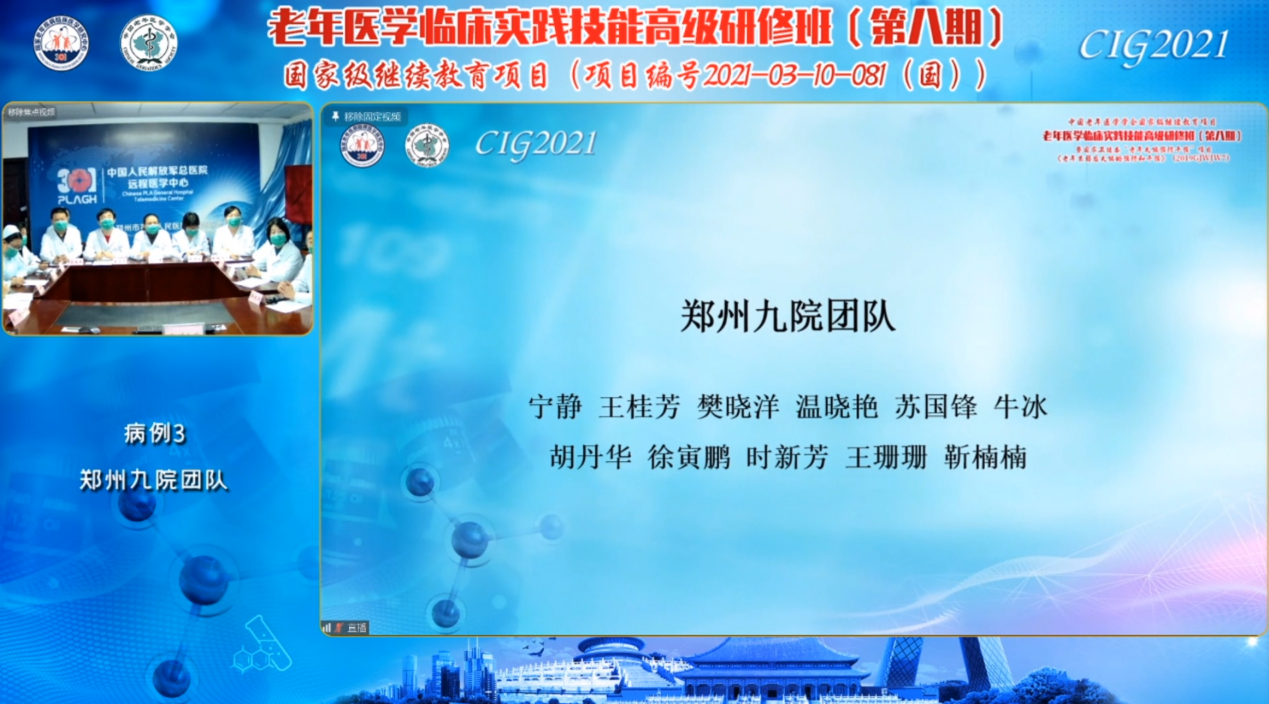
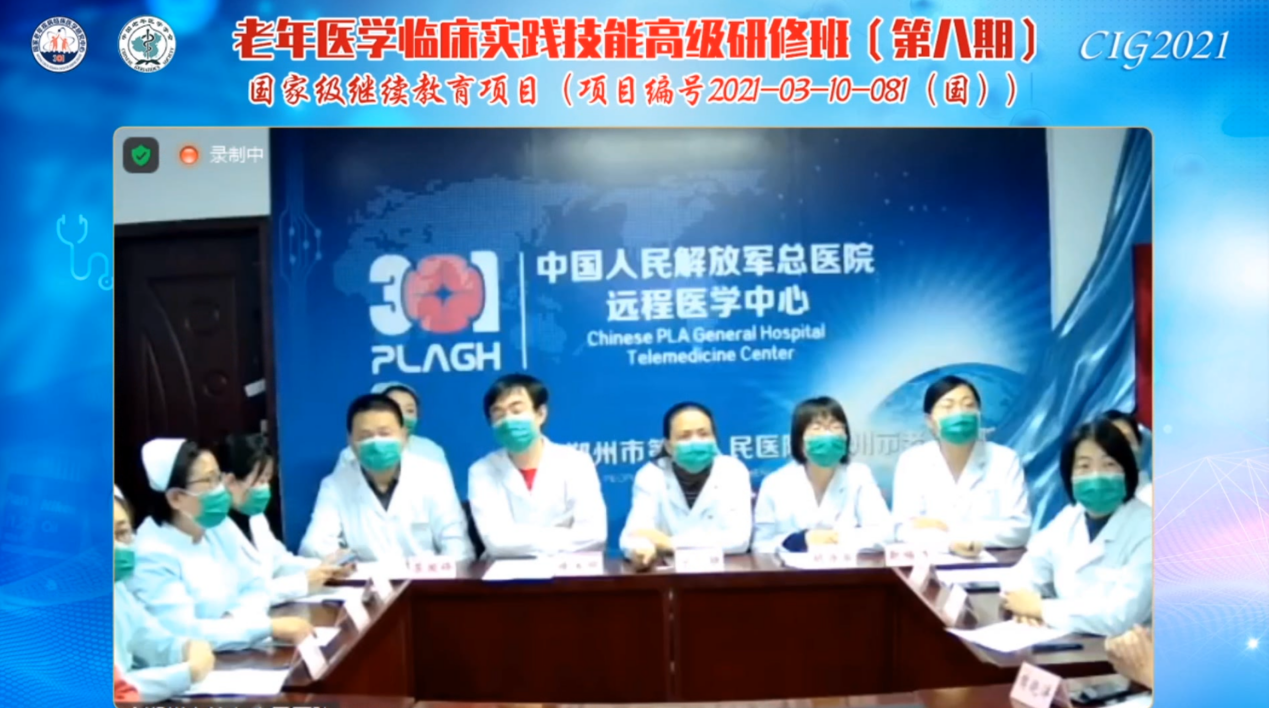 Finally, the case was shared by Yang Yunmei's team from the First Affiliated Hospital of Zhejiang University School of Medicine. The team made a wonderful speech on the topic of "Who pushed the first domino", introduced a case of outpatient senile debilitation with "weakness and poor tolerance for 2 weeks"; as the main complaint, extracted the cocoon, analyzed the layers, and finally identified the cause. The patients' functional status and quality of life have been improved by flexible use of comprehensive geriatric assessment technology and precise and continuous fateful management plan formulated by the multidisciplinary diagnosis and treatment team. Director Lu Jihui said in his comments: A comprehensive assessment of the elderly patients was carried out, and effective intervention was carried out for intervention risk factors from the perspective of the whole person, especially the cleaning of the mouth was noted, which is worth learning.
Finally, the case was shared by Yang Yunmei's team from the First Affiliated Hospital of Zhejiang University School of Medicine. The team made a wonderful speech on the topic of "Who pushed the first domino", introduced a case of outpatient senile debilitation with "weakness and poor tolerance for 2 weeks"; as the main complaint, extracted the cocoon, analyzed the layers, and finally identified the cause. The patients' functional status and quality of life have been improved by flexible use of comprehensive geriatric assessment technology and precise and continuous fateful management plan formulated by the multidisciplinary diagnosis and treatment team. Director Lu Jihui said in his comments: A comprehensive assessment of the elderly patients was carried out, and effective intervention was carried out for intervention risk factors from the perspective of the whole person, especially the cleaning of the mouth was noted, which is worth learning.
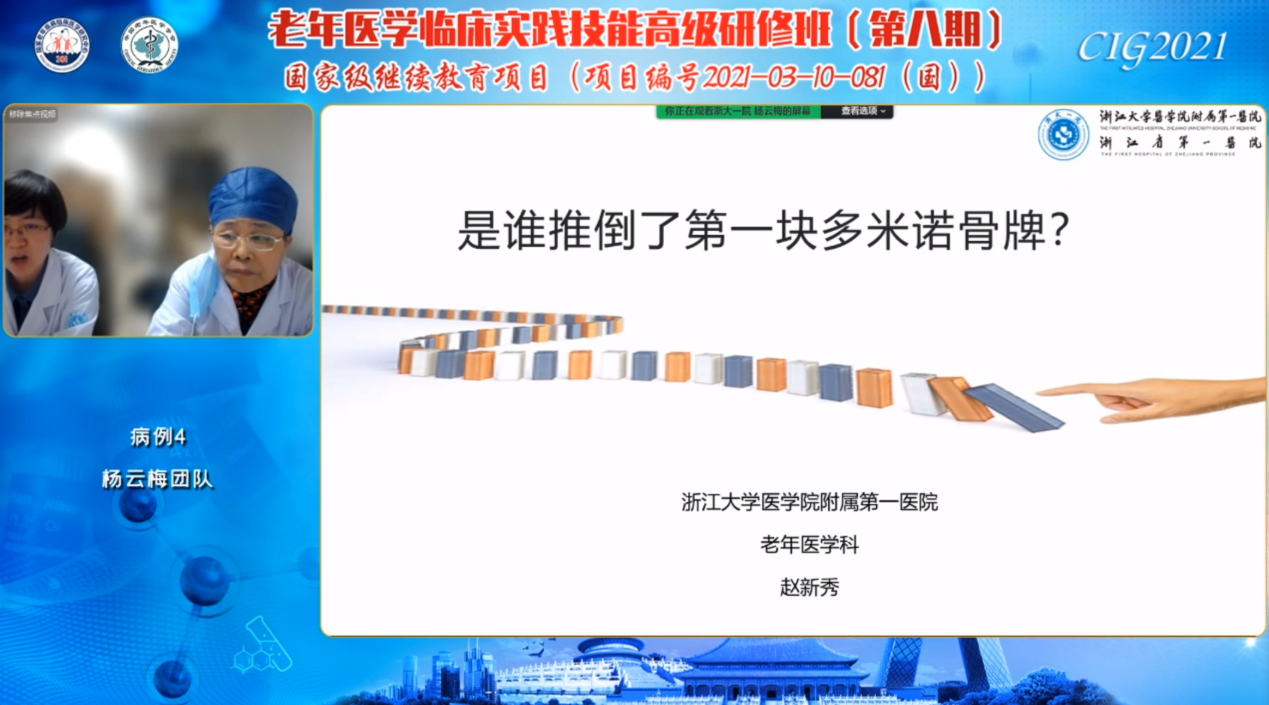
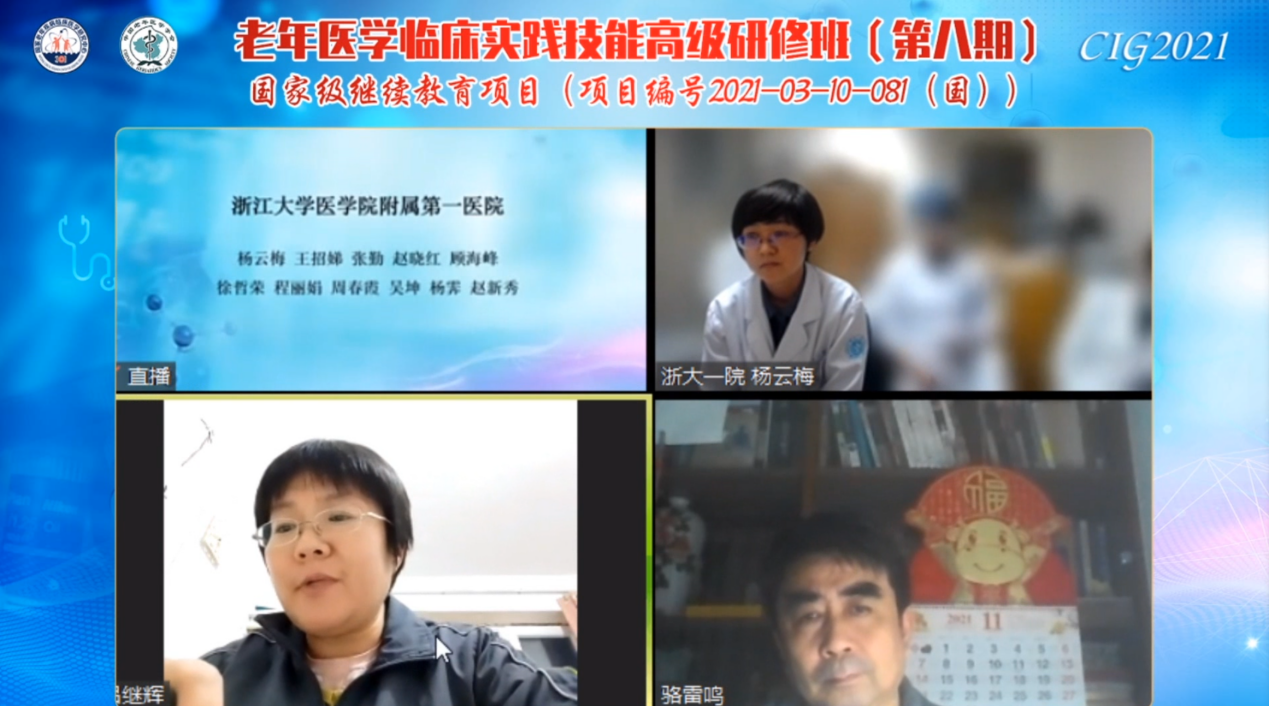 The second day of the training course nearly 10,000 people continued to pay attention online.
The second day of the training course nearly 10,000 people continued to pay attention online.
Prev
Notice on the First Round of the "Medical and Elderly Care Integration Health Management and Talent Capacity Enhancement Training Course" in 2025
Next
Clinical Skills Improvement Class for Geriatricians (Phase I) and Training Course on Comprehensive Assessment Technology and Application for the Elderly Held in Beijing

